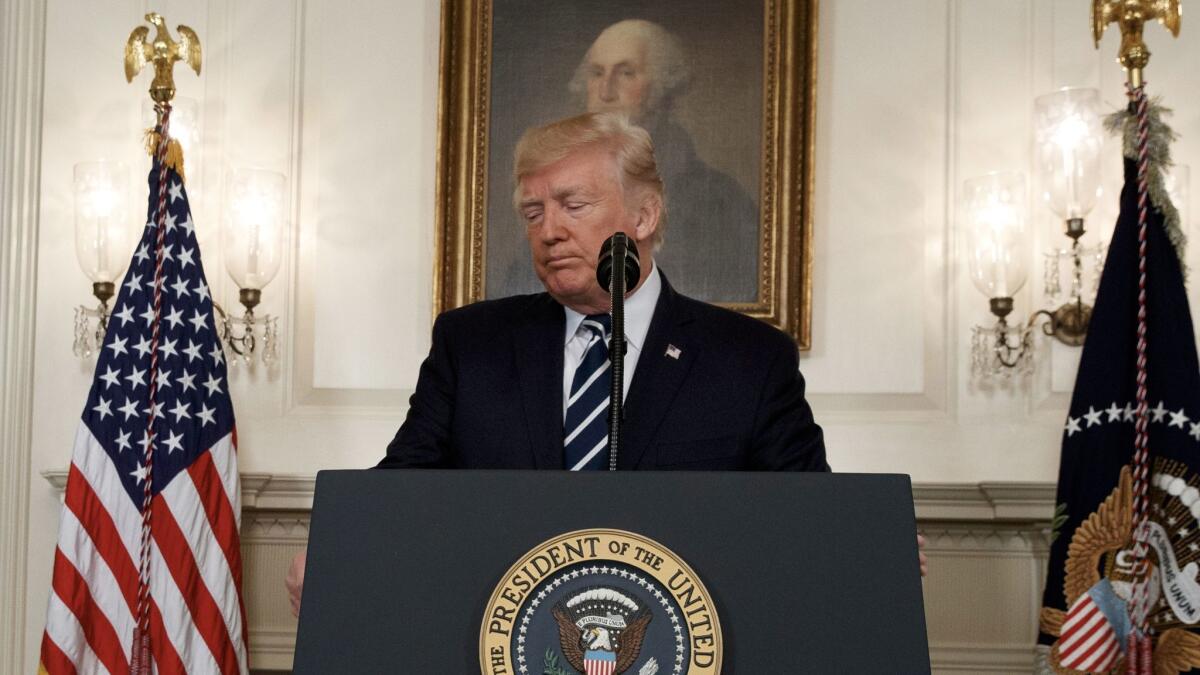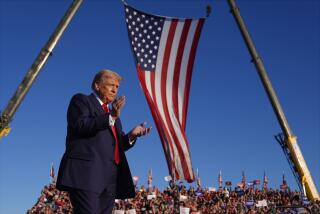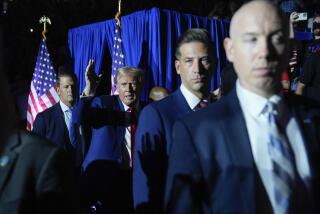Trump calls for unity in the face of ‘pure evil’ while resisting talk of gun control

- Share via
Reporting from Washington — President Trump called for unity and prayer in the aftermath of “an act of pure evil,” somberly addressing the nation from the White House on Monday hours after the worst mass shooting in modern U.S. history.
Trump, visibly moved and reading carefully from a teleprompter, announced that he would visit Las Vegas on Wednesday. That visit to the scene of a man-made disaster will follow his trip on Tuesday to storm-ravaged Puerto Rico, amid criticism that he and his administration have been slow to respond to the devastation caused by Hurricane Maria nearly two weeks ago.
The Las Vegas shooter “brutally murdered more than 50 people and wounded hundreds more. It was an act of pure evil,” Trump said.

President Trump gives his remarks about the Las Vegas shooting on Sunday.
Trump’s tone was a far different one than Americans are used to seeing from the president, who tends toward provocation and finger-pointing even at times of distress or tragedy, such as the mass shooting in Florida during the 2016 campaign. Instead of his typical tweets, Trump first spoke to the nation and then he and First Lady Melania Trump led a national moment of silence on the White House’s South Lawn. Also there were Vice President Mike Pence and his wife, Karen Pence, and scores of employees, from West Wing advisors to kitchen staff members.
At least in the initial stages of investigation and mourning, the White House was eager to steer clear of policy discussions, resisting calls from Democratic leaders in Congress to address gun control.
In recent years, Congress has repeatedly been unable to advance legislation to limit firearm ownership, even after mass shootings such as the 2012 massacre of 20 first-graders and six adults in Newtown, Conn., and the one in June when a gunman opened fire on Republican lawmakers at morning baseball practice ahead of a charity game. Republicans, who control Congress and the White House, generally oppose gun restrictions.
On the contrary, the only gun-related proposal with serious traction in Washington, one that predated the shooting, would loosen gun restrictions by making it easier to purchase silencers. House Republicans remain on track to approve a package of bills backed by the National Rifle Assn. that includes the silencer provision, though no vote has been scheduled.
Supporters say silencers can prevent hearing damage among hunters. Opponents argue that making silencers more prevalent could worsen the impact of mass shootings, by making it more difficult to react to the violence or detect where shots are coming from.
Former New York Police Commissioner and Los Angeles Police Chief William J. Bratton made that argument on MSNBC on Monday. “I’ve been a police officer for almost 50 years,” he said, and “the lack of regulation in this country defies sanity.”
White House Press Secretary Sarah Huckabee Sanders, who teared up during her daily news briefing with reporters as she discussed the shooting, declined to weigh in on the silencer bill. She said she had yet to discuss it with the president, but reminded reporters of Trump’s strong support for gun rights.
In response to multiple questions about gun restrictions, Sanders echoed an argument often heard from pro-gun groups and their supporters, saying it is too soon to talk about such matters.
“There is a time and place for political debate, but now is a time to unite as a country,” Sanders said.
She did not rule out a gun-control discussion, however. She told reporters that policy issues are “something that we can talk about in the coming days.”
Trump, who appeared downcast as he read his statement in the White House’s Diplomatic Reception Room, praised first responders, saying “the speed with which they acted was miraculous and prevented further loss of life.”
Speaking of the victims and their families suffering the loss of “a parent, a child, a brother or sister,” he said, “we cannot fathom their pain, we cannot imagine their loss.”
During such tragedies, Americans typically expect a president to provide comfort, and to serve as a unifying figure for the country.
“Our unity cannot be shattered by evil. Our bonds cannot be broken by violence,” he said. “It is our love that defines us today and always will forever.”
Trump was a candidate during the June 2016 attack at the Pulse nightclub in Orlando, Fla., that killed 49 people — previously the worst gun massacre in modern U.S. history. At the time, he tweeted extensively, criticizing President Obama and Hillary Clinton, his Democratic rival, while arguing that the events vindicated his proposal to ban Muslims from entering the country.
“What has happened in Orlando is just the beginning,” Trump tweeted then. “Our leadership is weak and ineffective. I called it and asked for the ban. Must be tough.”
He also used the event to vindicate his false assertion that Muslims in New Jersey held mass celebrations following the Sept. 11 attacks. “I was right,” he tweeted after Orlando.
By contrast, after the school shooting at Newtown, Trump initially praised the response by Obama. “President Obama spoke for me and every American in his remarks in #Newtown Connecticut,” he tweeted at the time.
Sanders on Monday dismissed questions about Trump’s rhetoric following the Pulse shooting, saying, “there’s a difference between being a candidate and being the president.”
She also criticized Clinton, who on Monday tweeted opposition to the silencer bill and urged Americans to stand up to the NRA.
“It’s very easy for Mrs. Clinton to criticize and to come out, but I think we need to remember, the only person with blood on their hands is that of the shooter,” Sanders said. “And this isn’t a time for us to go after individuals or organizations.”
The Sportsmen’s Heritage and Recreational Enhancement, or SHARE, Act was introduced last month in Congress, and gun advocates hoped for swift passage. It would allow gun owners to transport registered firearms across state lines, carry guns in national parks and eliminate the $200 transfer tax on silencers.
Earlier versions of the bill had stalled under Obama, but advocates have been hopeful that Congress will send it to Trump’s desk to be signed into law.
“America’s gun owners have been waiting for many years for Congress to send the SHARE Act to the president’s desk,” the NRA’s legislative arm wrote when the bill was introduced. “Their patience may now be rewarded with the strongest, most far-reaching version of the act yet.”
Sen. Christopher S. Murphy, a Democrat from Connecticut who has taken the lead on gun-safety issues after the Newtown shooting, urged lawmakers to act against such a bill and for gun restrictions.
“This must stop. It is positively infuriating that my colleagues in Congress are so afraid of the gun industry that they pretend there aren’t public policy responses to this epidemic,” Murphy said. “It’s time for Congress to get off its ass and do something.”
Los Angeles Times staff writer Brian Bennett contributed to this report.
Twitter: @noahbierman and @lisamascaro
More to Read
Get the L.A. Times Politics newsletter
Deeply reported insights into legislation, politics and policy from Sacramento, Washington and beyond. In your inbox twice per week.
You may occasionally receive promotional content from the Los Angeles Times.










